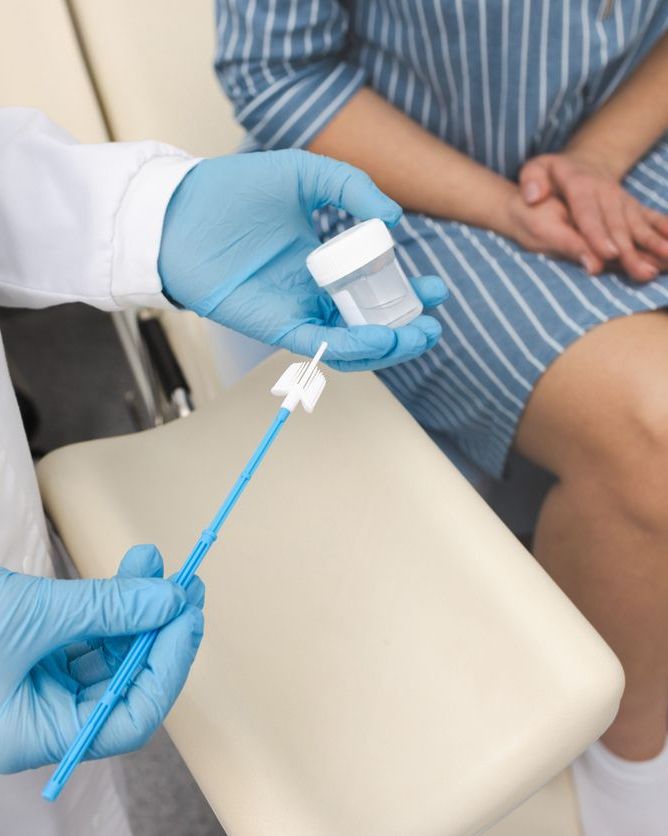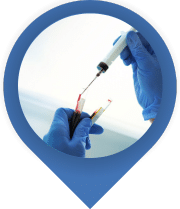The Latest Healthcare News
Check out our blog to learn more from our team about the latest medical advancements, health tips, and primary care news.

AllCare offers a full range of women’s health care services, including Pap smears, which can detect the earliest signs of cervical cancer. Our experienced women’s health specialists are dedicated to providing comprehensive care tailored to the unique needs of women through every stage of life.

Pap smears are an important way to stay on top of your health, helping catch abnormal cervical changes early before they become more serious. At AllCare, we know every woman’s needs are unique, and we’re here to make the process as comfortable and stress-free as possible. Along with routine Pap smears, we provide HPV testing, follow-up care for abnormal results, and personalized guidance to keep your cervical health on track.
With our all-in-one care model, you can take care of everything from your annual wellness check to preventive screenings and other women’s health services—all in one place. No need to see multiple specialists; we’re here to simplify your care and give you the support you need, every step of the way. At AllCare, your health and peace of mind are always our priority.
A Pap smear, also known as a Pap test, is a simple and routine screening procedure that checks for abnormal changes in the cells of the cervix, the lower part of the uterus that connects to the vagina. This test is designed to detect early signs of cervical cancer, as well as precancerous conditions caused by HPV (human papillomavirus), the most common cause of cervical cancer.
A Pap smear is a quick, typically painless procedure that plays a crucial role in preventive healthcare by identifying issues early when they are most treatable.

This common examination checks the health of your reproductive organs, including your vagina, uterus, ovaries, fallopian tubes, and cervix.

If your Pap smear is abnormal, you may require additional testing, which may include a colposcopy, Endocervical Cutterage, or Loop Electrosurgical Excision Procedure. If it is determined your cells are cancerous, you may require additional testing and treatment, which may consist of imaging tests, radiation, chemotherapy, or a complete hysterectomy.

Pap smears and HPV (human papillomavirus) tests are often performed at the same time. Regular cervical cancer screenings, including Pap tests and HPV testing, play a crucial role in detecting early signs of cervical abnormalities or HPV infections, allowing for timely intervention and preventive measures.

This biopsy removes a larger cone-shaped sample of tissue from your cervix.

We may refer you to a gynecologist for follow-up care or additional treatment options if necessary.

Anyone with a cervix aged 21 and older can benefit from receiving a Pap smear. While it is mainly performed as an early screening test for cancer, even for those who have no symptoms, there are some symptoms that may indicate the need for a Pap smear, including:
Our all-in-one model of care means you can receive your Pap smear, annual gynecological exam, preventative care, and additional services dedicated to women’s health in one convenient location.
The recommended frequency for Pap smears varies based on age and health history. Women between the ages of 21 and 29 should have a Pap smear every three years. For women aged 30 to 65, it’s important to talk to your healthcare provider about whether to have both a Pap smear and an HPV test every five years or if having just a Pap smear every three years is enough.
Pap smear results typically take 1 to 3 weeks to come back, depending on the lab and healthcare provider’s processes.
If you haven’t received your results within three weeks, it’s a good idea to check in with your provider.
During the procedure, you’ll lie on your back on the exam table and place your feet in stirrups. Your doctor or nurse practitioner will gently insert a speculum into your vagina to widen it, allowing them to access the cervix. Next, they’ll use a small instrument to collect a sample of cells from the cervix. Depending on your age and medical history, they may also take a sample using a swab for an HPV test.
While the insertion of the speculum may feel uncomfortable, the test should not hurt. You may feel a slight bit of pressure in the pelvic area. However, if you do feel pain, let your doctor know right away.
Abnormal Pap tests are common, and an abnormal Pap smear does not always indicate cancer. In fact, less than 1% of abnormal Pap smears are cancerous. You should call your PCP or gynecologist to determine any next steps, which may include a repeat Pap smear, monitoring, additional testing, or treatment.
At AllCare, we’re proud to deliver exceptional primary and immediate care to residents across Virginia, Maryland, and Washington, D.C. From bustling city centers to serene suburban neighborhoods, our clinics are strategically placed for your convenience and care. Experience top-tier pap smear (pap test) in your community with AllCare, where your health is our priority.
Check out our blog to learn more from our team about the latest medical advancements, health tips, and primary care news.
Seasonal Affective Disorder (SAD) represents a significant mental health concern affecting approximately 5% of adults in the United States. This […]
Read More >Mammograms save lives. Early detection of breast cancer through proper screening will give a patient a remarkable 99% five-year survival […]
Read More >Most people are aware that diet, exercise, and genetics affect cholesterol levels. But can stress raise your cholesterol? The answer […]
Read More >Our related healthcare services extend beyond immediate care to include preventive care such as routine physical exams, chronic disease management for conditions like diabetes, and specialty care referrals for more complex health issues.